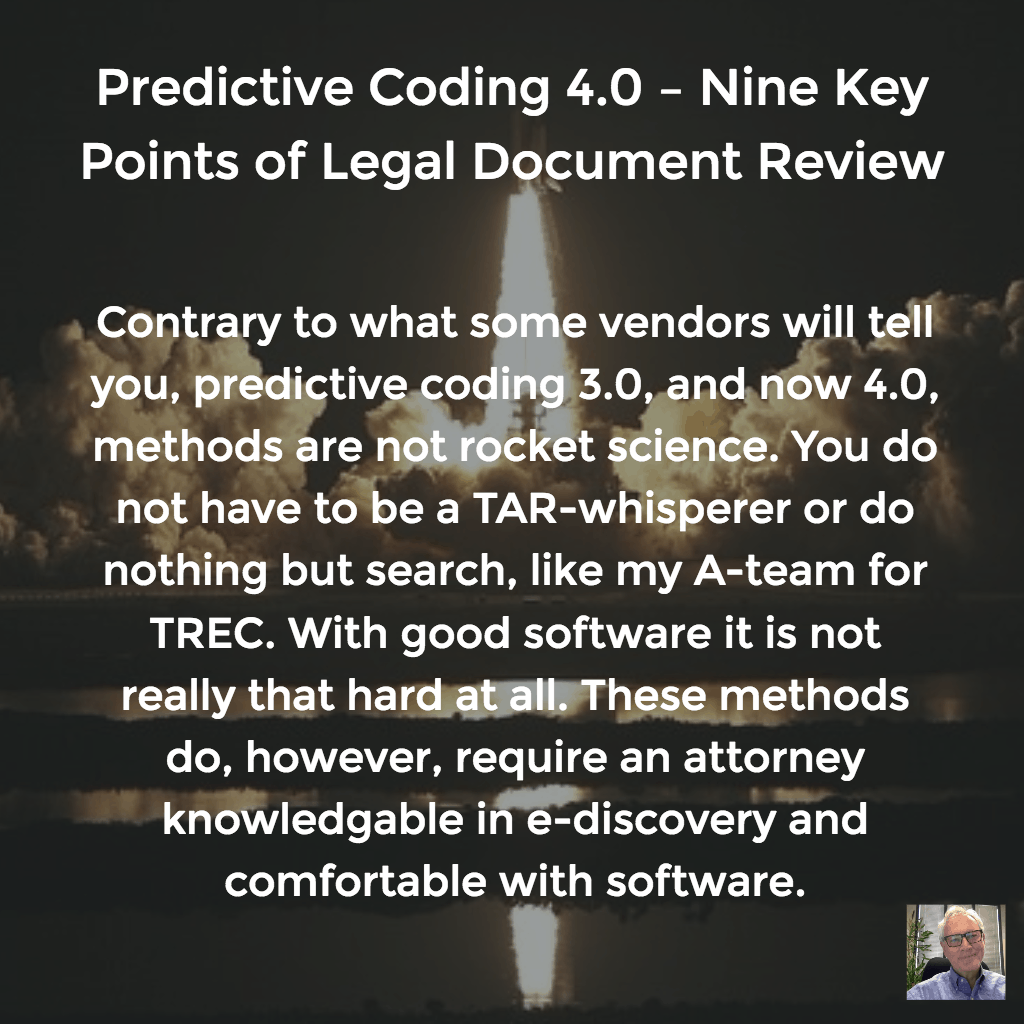ARCHIVED CONTENT
You are viewing ARCHIVED CONTENT released online between 1 April 2010 and 24 August 2018 or content that has been selectively archived and is no longer active. Content in this archive is NOT UPDATED, and links may not function.Extract from article by Ralph Losey
This blog introduces the e-Discovery Team’s latest insights and methods of document review.
Only full featured document review platforms with active machine learning abilities can use all of the Predictive Coding 4.0 methods described here.
Sorry dear start-up vendors, and others, but that’s the truth. Consumers, you get what you pay for. You know that. Not sure? Get the help of an independent expert advisor before you make substantial investments in e-discovery software or choose a vendor for a major project. Also, if you have tried predictive coding, or what you were told was advanced TAR, whatever the hell that is, and it did not work well, do not blame yourself. It could be the software. Or if not the software, then the antiquated version 1.0 or 2.0 methods used. There is a lot of bullshit out there. Excuse my French. There always has been when it comes to new technology. It does, however, seems especially prevalent in the legal technology field. Perhaps they think we lawyers are naive and technologically gullible. Do not be fooled. Again, look to an independent consultant if you get confused by all the vendor claims.
Contrary to what some vendors will tell you (typically the ones without bona fide predictive coding features), predictive coding 3.0, and now 4.0, methods are not rocket science. You do not have to be a TAR-whisperer or do nothing but search, like my A-team for TREC. With good software it is not really that hard at all. These methods do, however, require an attorney knowledgable in e-discovery and comfortable with software. This is not for novices. But every law firm should anyway have attorneys with special training and experience in technology and e-discovery. For instance, if you practice in the Northern District of California, an e-discovery liaison with such expertise is required in most cases. See Guidelines for the Discovery of Electronically Stored Information. Almost half of the Bar Associations in the U.S. require basic technology competence as an ethical imperative. See eg. ABA Model Rule 1.1, Comment [8] and Robert Ambrogi’s list of 23 states, and counting, that now require such competence. (My own law firm has had an e-discovery liaison program in place since 2010, which I lead and train. I am proud to say that after six years of work it is now a great success.) So no, you do not have to be a full-time specialist, like the members of my TREC e-Discovery team, to successfully use AI-enhanced review, which we call Hybrid Multimodal. This is especially true when you work with vendors like Kroll Ontrack, Catalyst and others that have teams of special consultants to guide you. You just have to pick your vendors wisely.
Read the complete article at Predictive Coding 4.0 – Nine Key Points of Legal Document Review (Part One)






















